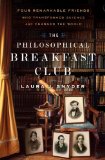Page 4 of 5
There are currently 35 member reviews
for The Philosophical Breakfast Club
-
Anna S. (Auburn, AL)
The Philosophical Breakfast Club
First, let me say that I love this book and second, let me say that I don't think everyone will. Anyone with an interest in the history of science and technology will find it fascinating. One of the things I really liked about it was the fact that these four incredibly brilliant men were presented, warts and all, and not merely as plaster saints. What was almost incredible, though, was the breadth of their knowledge. In addition to being scientists (a term coined by one of them), they were poets and linguists and artists and other things as well. In today's world of hyper-specialization, it's hard to imagine any scientist being fluent in so many different areas. What a lesson for us all!
-
Jon V. (Marysville, PA)
Titans of Science
It would have been enough to devote this book to even one of the four scientists Snyder profiles. That she deftly weaves in and out of all four men's lives, highlighting their relationships, their philosophies, and their scientific contributions is remarkable. The science can become overwhelming at times, but for someone with a broad curiosity or an abiding interest in science, it's worth the read.
-
Dorothy M. (Maynard, MA)
From generalist amateurs to professional scientists
At the beginning of the 19th century, what we now think of as scientific pursuits were the purview of talented and often wealthy amateurs. Scientist was not a word, there was no money to support research, and the concept of a scientific method was unknown. Four visionary Cambridge students, Richard Jones, Charles Babbage, William Whewell and John Herschel were determined to change this and, amazingly through their work and their influence on the work of those who followed them, managed to do so. In telling their story, Laura J. Snyder also tells the story of the Victorian age - politically and socially as well as providing (often in excruciating detail) information on their varied work.
Because they were generalists rather than specialists, the subjects range from poetry to code breaking to astronomy to tide mapping to economic theory and more. William Whewell, as an example, is described as a “mathematician - mineralogist - architectural historian - linguist - classicist - physicist - geologist - historian - philosopher - theologian - mountainclimbing - poet”. In explaining the scope of the influence of these men, Snyder covers the work of pretty much everyone they knew - who, it appears, was everyone remotely involved in scientific research during their lifetime and beyond. This book will be a real historical treat for members of the scientific community and for those of us less familiar with the subject, it is an engaging primer.
-
Celia A. (Takoma Park, MD)
Slow read, but worth it
The writing style tended to be more academic than your typical popular book, so it was occasionally slow going. The author tends to go off on tangents that, although they come back around to her four protagonists, could probably be deleted without hurting the book. Despite these minor flaws, I enjoyed reading this book about a part of the history of science that I know very little. I'm glad that I pushed through to the end.
-
Vivian H. (Winchester, VA)
The Birth of Modern Science
This book is for anyone who has an interest in 19th Century history - not just scientific developments. Four men of quite different backgrounds met at Cambridge and came to believe in the Baconian view that scientific discovery should benefit humankind, make the lives of ordinary people better. It was fascinating for me to read about the dawn of modern economics and how the political arguments of the time echo the same arguments we have today about social welfare. I wanted to read this book because I have an interest in John Herschel and his contribution to early photography and astronomy. But this story is so much more...about lifelong friendships, the industrial revolution, the pursuit of knowledge and scientific discovery through experimentation. This book is accessible for non scientists such as myself, is well written and gives amazing insights into the birth of modern science.
-
Penny P. (Santa barbara, Calif)
A look at science
Not having much background (or interest) in science, it took a couple of attempts to get into this book. Once I did,it was fairly easy to understand and was pretty interesting.The writing was good and did a good job of providing a historic perspective. I know more about the subject than I did before so that is a good thing. I have a friend that is interested in science and I know she will appreciate the book.
-
Deb Y. (Blanco, TX)
Scientists
The Philosophical Breakfast Club is well written and very easy to read, even for a truly science-challenged person such as I. Laura Snyder has taken the subject and made it worth a read (even if you care nothing about philosophy/scientists), as it involves much, much more. Please read it when you have some time to sit and savor...
